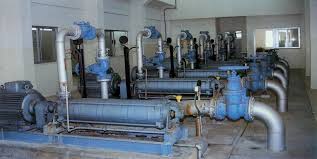Education programmes of job
Electrical Engineering Renewable Mechanical Energy Engineering
Mechanical Power Engineering
Renewable Electrical Power Engineering

Nature of work
HVAC is a common abbreviation for the field that involves heating, ventilation, and air conditioning systems. A HVAC engineer is an expert in designing systems that control temperature and air flow throughout buildings. He/she is responsible for designing, manufacturing, testing heating and air conditioning systems. He/she can be in charge of designing these systems for new buildings, or for retrofitting existing buildings. The daily duties of a HVAC engineer include both hands-on and administrative tasks. After the main design of building has been drafted, a HVAC engineer uses the computer-aid design application to develop the blueprints that will specify the necessary equipment, guide the contractors toward correct installation of heating and cooling systems within a building. Throughout the construction of a project, the HVAC engineer may also frequently visit the job site for the purpose of answering questions or to ensure the proper installation by HVAC installers. After finishing, the engineer evaluates the system to increase the performance to the maximum. Environment of work
A HVAC Engineer works full time, with occasional evening or weekend shifts. During peak heating and cooling seasons, he/she often works overtime or irregular hours. The majority of Engineers work with contractors. Those who are self-employed have the ability to set their own schedules. A HVAC Engineer who services both heating and air conditioning equipment generally has constant working hours. particularly as a growing number of manufacturers and contractors now provide or even require year-round service contracts. He/she is exposed to some injuries and illnesses more than other careers such as, electrical shock, burns, muscle strains, and other injuries. Appropriate safety equipment is necessary when handling refrigerants because electricity shock can cause skin damage, or blindness. When working in narrow spaces, inhalation of refrigerants is also a risk. Professional life
A HVAC engineer might find work with a HVAC installation company, general contractor, architectural agency, engineering firm, government entity, large corporation, or as an independent consultant. Individuals who choose this field of study are attracted by employers and typically find work easily because such systems are needed at buildings and offices. After gaining a few years of experience in this field, A HVAC engineer moves on to senior roles or starts his/her own design and manufacturing firms.Range of typical starting salaries: 60000 SYP.
Getting the job
The majority of organizations will require engineers to have an undergraduate degree in HVAC engineering or mechanical engineering or in an equivalent area. Some employers may also require that the candidate earn a graduate-level qualification, while others will also accept a job experience instead of such a degree. Most employers, however, look for a bachelor's degree and at least several years of relevant work experience. Candidates looking to pursue a job in this field of work will need to excel at mathematics, science, physics, fluid dynamics, thermodynamics, electrical engineering, and mechanical studies. Of course, knowledge of basic construction principles is also essential, as this professional works with contractors in regard to both design and implementation. In order to develop his/her professional life, a HAVAC engineer should be a member at the Order of Syrian engineers. Skills
A HVAC engineer must have strong computer skills and know how to use computer-aided design software. Strong analytical and problem solving skills are essential, as much of his/her work involves testing systems for energy consumption in order to determine additional requirements. A HVAC engineer must be good at estimating costs and generally have good business skills. He/she must be able to communicate effectively with contractors and have strong interpersonal skills. Sources and references
If you need any further information on what is included in this file, you can visit the following websites:· www.hvac-academy.com, Offers advanced engineering training in the field of HVAC systems
· The Order of Syrian engineers, Damascus, Tel: 6627256
· www.arab-eng.org, Arab Engineers Forum.
· Arab Standard Classification of Occupations, 2008, Ed. Arab Labor Organization.
